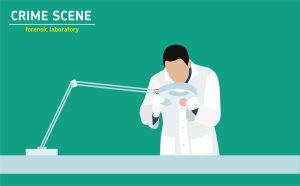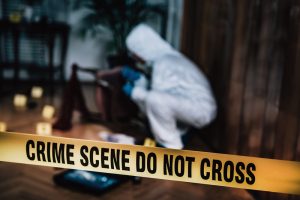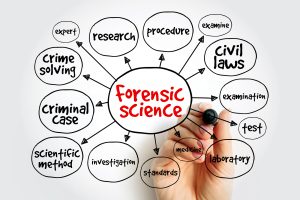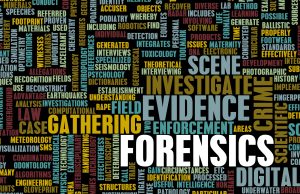By – James M. Katz, BA
Forensic nurse specialists play a crucial role in bridging the gap between healthcare and the justice system. These highly trained professionals combine medical expertise with legal knowledge to provide specialized care for victims of violence and assist in criminal investigations. Their unique skill set has become increasingly valuable in today’s complex healthcare landscape, where the intersection of medicine and law enforcement continues to grow. Their role is crucial in solving crimes and ensuring justice is served, making it a rewarding yet challenging career path.
This article explores the essential qualifications and training required to become a forensic nurse specialist. It delves into the educational background, core responsibilities, and specialized areas of practice within this field. Additionally, it examines the certification process, career opportunities, and work settings available to these professionals. By shedding light on this important nursing specialty, we aim to provide a comprehensive overview for those interested in pursuing a career in forensic nursing or seeking to understand its significance in modern healthcare and criminal justice systems.
Key Takeaways
- Forensic Nurse Specialists provide medical care to both victims and perpetrators of crimes.
- They play a vital role in collecting and documenting evidence that can be used in legal proceedings.
- Educational pathways include basic nursing education, advanced degrees, and specialized forensic nursing programs.
- These nurses can specialize in areas like sexual assault examination, death investigation, and psychiatric forensic nursing.
- Forensic Nurse Specialists work in various environments including hospitals, community programs, and correctional facilities.
What is a Forensic Nurse Specialist?
Definition
A forensic nurse specialist is a registered nurse who combines the holistic care of nursing with principles from law, medicine, and science. This unique blend of skills allows them to provide specialized care for individuals who intersect with both the healthcare and legal systems. The International Association of Forensic Nurses defines forensic nursing as “the application of nursing science to public or legal proceedings”.
Forensic nurse specialists play a crucial role in bridging the gap between healthcare and the justice system. They are trained to provide comprehensive care to victims of violence while demonstrating competency in conducting medical forensic exams, evaluating evidence collection, providing effective courtroom testimony, and showing compassion and sensitivity towards survivors of violence.
Role in Healthcare and Legal Systems
Forensic nurse specialists serve as vital links between healthcare and the judicial system. Their primary objective during examinations is to ensure the medical well-being of patients. However, their expertise extends beyond patient care to include the meticulous collection and preservation of evidence crucial for legal scrutiny.
These professionals are uniquely positioned to ensure that evidence collected during medical examinations is admissible in court, thereby playing a pivotal role in the administration of justice. They are trained to document injuries, collect DNA samples, take photographs, and maintain medical records with precision. Their testimony as expert witnesses can elucidate the nature of injuries and the treatment provided, potentially influencing legal outcomes.
Collaboration with law enforcement is key for forensic nurse specialists, as it facilitates a comprehensive approach to patient care and criminal investigation. They must be well-versed in legal standards, regulations, and ethics of nursing and healthcare, operating within the bounds of jurisdictional laws while maintaining a high standard of practice that can withstand legal scrutiny.
Types of Cases Handled
Forensic nurse specialists work with a diverse range of cases, providing care and support to various individuals involved in criminal or civil legal issues. Some of the primary types of cases they handle include:
1. Sexual Assault: As Sexual Assault Nurse Examiners (SANE), they serve as the first point of care for sexual assault victims, completing forensic exams and providing holistic nursing care.
2. Child Abuse: They assist in cases involving suspected child abuse or neglect.
3. Domestic Violence: Forensic nurse specialists provide care and support to victims of domestic violence.
4. Elder Abuse: As Forensic Gerontology Specialists, they investigate cases surrounding elder abuse and exploitation.
5. Death Investigations: Working as Forensic Nurse Investigators or Nurse Coroners, they assist in determining causes of unexpected or violent deaths.
6. Psychiatric Cases: Forensic Psychiatric Nurses treat and manage victims and offenders with serious mental health issues or disorders.
7. Correctional Healthcare: As Correctional Nursing Specialists, they provide routine and specialized care to individuals in jails, prisons, and other correctional institutions.
8. Legal Consultations: Legal Nurse Consultants assist attorneys with cases that require medical expertise, such as medical malpractice or personal injury lawsuits.
Forensic nurse specialists often work on-call, responding to the medical needs of victims in communities during nights, holidays, and weekends. Their diverse skill set allows them to adapt to various settings, including hospitals, anti-violence programs, psychiatric institutions, coroners’ and medical examiners’ offices, and correctional facilities.
Roles and Responsibilities of a Forensic Nurse Specialist
Providing Medical Care to Victims and Perpetrators
Forensic Nurse Specialists offer medical care to both victims and perpetrators of crimes. They treat injuries, provide emotional support, and ensure that patients receive the necessary medical attention. Their role is crucial in bridging the gap between healthcare and the legal system.
Collecting and Documenting Evidence
These nurses are responsible for collecting and documenting evidence that can be used in legal proceedings. This includes taking photographs of injuries, preserving clothing, and gathering other physical evidence. Their meticulous documentation is vital for the integrity of the evidence.
Testifying in Legal Proceedings
Forensic Nurse Specialists often testify in court about the evidence they have collected and the care they have provided. Their testimony can be pivotal in criminal cases, helping to establish facts and provide expert opinions.
Collaborating with Law Enforcement
These specialists work closely with law enforcement agencies to ensure that evidence is properly collected and preserved. They also provide insights into the medical aspects of cases, helping law enforcement understand the implications of injuries and other medical findings.
Continuing Education and Professional Development
The field of forensic nursing is always evolving, so continuing education is crucial. Many professional organizations offer courses, seminars, and workshops to help you stay updated on the latest practices and technologies. Ongoing education not only keeps your skills sharp but also opens up new career opportunities.
Licensure
After completing a nursing degree, aspiring forensic nurse specialists must obtain a registered nurse (RN) license. This involves passing the National Council Licensure Examination (NCLEX). The NCLEX is a standardized test used by state boards of nursing to determine if candidates qualify for nursing licensure. It’s a crucial step in the process of becoming a forensic nurse, as it validates the graduate’s knowledge and skills in nursing practice.
Specialized Forensic Training
Once licensed as an RN, nurses can pursue specialized training in forensic nursing. This additional education is essential for developing the unique skill set required in this field. Specialized training often comes in the form of certification programs, which typically offer a combination of clinical training and classroom hours.
One notable certification is offered by the American Institute of Health Care Professionals, Inc. This program is designed for licensed RNs and nurse practitioners specializing in forensic nursing practice and covers all aspects of forensic nursing, including forensic pathology.
The International Association of Forensic Nurses (IAFN) offers two tracks for professional credentials in sexual assault cases:
1. Certified Adult/Adolescent Sexual Assault Nurse Examiner (SANE-A): This certification focuses on adult and adolescent patients. Training covers forensic evidence collection, crisis intervention, sexually transmitted infections testing, drug testing, and emergency contraception.
2. Certified Pediatric Sexual Assault Nurse Examiner (SANE-P): This certification focuses on pediatric patients and is currently the most in-demand forensic nurse certification.
It’s important to note that forensic nursing requirements can vary depending on location and specific job opportunities. Some positions may require an advanced degree, such as a Master of Science in Nursing (MSN). Some programs even offer a double master’s degree in nursing and criminal justice for those equally committed to both fields. Regardless of the specific educational path chosen, gaining relevant clinical experience is crucial. Areas such as medical-surgical nursing, pediatric nursing, or psychiatric nursing can provide valuable experience working with populations that forensic nurses often encounter.
Essential Skills and Qualities
Forensic nurse specialists require a unique blend of clinical expertise, legal knowledge, communication skills, and emotional resilience to excel in their roles. These professionals serve as vital links between healthcare and the judicial system, necessitating a diverse skill set to navigate the complexities of both fields effectively.
Clinical Expertise
Forensic nurse specialists must possess a strong foundation in nursing practice and specialized forensic knowledge. They need to be adept at identifying signs of abuse, conducting thorough physical examinations, and providing appropriate care to victims of violence. Their clinical skills extend beyond traditional nursing, as they are responsible for collecting and preserving evidence that may be crucial in legal proceedings. This includes gathering blood, tissue, and fluid samples, as well as documenting and photographing physical injuries.
In addition to patient care, forensic nurses may be involved in death investigations, working alongside coroners to determine the cause of unexpected, accidental, or violent deaths. This requires a keen eye for detail and the ability to analyze crime scenes critically.
Legal Knowledge
A deep understanding of legal principles and procedures is essential for forensic nurse specialists. They must be well-versed in the legal standards, regulations, and ethics that govern both healthcare and the judicial system . This knowledge enables them to ensure that their actions and documentation can withstand legal scrutiny and are admissible in court.
Forensic nurses often serve as expert witnesses in legal proceedings, elucidating the nature of injuries and the treatment provided. They must be able to translate complex medical information into understandable language for legal professionals and juries. Additionally, they need to be familiar with jurisdictional laws and operate within these boundaries while maintaining high standards of practice.
Communication Skills
Effective communication is paramount in forensic nursing. These professionals must possess excellent interpersonal skills to establish trust with patients and their families, often in highly sensitive and emotionally charged situations. They need to be able to conduct thorough interviews with patients and others involved in criminal investigations while remaining sensitive to the emotional and psychological state of the individuals. Clear and concise documentation is crucial in forensic nursing. Forensic nurse specialists must be meticulous in recording medical findings, collecting evidence, and preparing reports that may be used in legal proceedings. They also need to collaborate effectively with multidisciplinary teams, including law enforcement, legal professionals, and other healthcare providers.
Emotional Resilience
Working with victims of violence and trauma requires exceptional emotional resilience. Forensic nurse specialists must be compassionate and empathetic while maintaining professional boundaries to protect themselves from emotional stress. They often interact with patients and families who have experienced horrendous injuries or losses, requiring a delicate balance of comfort and objectivity.
A study on personal resilience enhancement for forensic nurses found that implementing resilience programs can significantly improve nurses‘ confidence and professional relationships. The study reported that nurses’ personal resilience levels increased from a mean of 3.42 (SD = 0.70) pre-program to 4.12 (SD = 0.60) post-program. These findings highlight the importance of nurturing resilience in forensic nursing to enhance job satisfaction and potentially improve nurse retention and recruitment.
In conclusion, forensic nurse specialists must possess a unique combination of clinical expertise, legal knowledge, communication skills, and emotional resilience. These qualities enable them to provide compassionate care to victims, collect and preserve crucial evidence, and contribute effectively to the legal process. Continuous professional development and resilience-building programs are essential to maintain and enhance these skills throughout their careers.
Core Responsibilities
Forensic nurse specialists have a unique set of responsibilities that bridge the gap between healthcare and the legal system. Their role encompasses patient care, evidence collection, documentation, and courtroom testimony. These professionals play a crucial part in providing comprehensive care to victims of violence while ensuring that the legal aspects of their cases are properly addressed.
Patient Care
The primary responsibility of forensic nurse specialists is to provide compassionate and thorough medical care to patients who have experienced trauma or abuse. They assess, examine, and treat victims of violence, abuse, or neglect. The medical well-being of the patient is the foremost objective during the examination. Forensic nurses offer specialized medical care that addresses both the physical and emotional needs of their patients.
In addition to medical treatment, forensic nurses provide emotional support and counseling to victims and their families. They must be skilled in crisis intervention and possess the ability to offer comfort to individuals who have experienced traumatic events. This aspect of their role requires a high level of empathy and the ability to create a safe, supportive environment for patients.
Evidence Collection
One of the most critical responsibilities of forensic nurse specialists is the collection and preservation of evidence. https://www.medscape.org/viewarticle/571057 This task is essential for supporting potential legal proceedings related to the patient’s case. Forensic nurses are trained to identify, collect, and safeguard evidence that may be crucial in criminal investigations.
The evidence collection process may include:
1. Gathering blood, tissue, and fluid samples
2. Documenting and photographing physical injuries
3. Collecting oral, peri-oral, and genital swabs
4. Preserving any debris or foreign materials identified
5. Obtaining buccal swabs or blood for the patient’s DNA
Forensic nurses must be meticulous in their approach to evidence collection, ensuring that the chain of custody is maintained and that all samples are properly handled and preserved. This attention to detail is crucial for maintaining the integrity of the evidence for potential use in legal proceedings.
Documentation
Accurate and thorough documentation is a cornerstone of the forensic nurse specialist’s responsibilities. They are tasked with recording all aspects of the patient’s care, including:
1. Consent obtained for the examination
2. Medical history
3. Detailed description of the examination findings
4. Interpretation of findings
5. Forensic samples collected
6. Testing and treatment provided
7. Descriptions of photographic images taken
8. Discharge plan and follow-up care scheduled
Documentation must be precise, using standard terminology and descriptive language. Forensic nurses are required to accurately reflect the patient’s demeanor and statements made during the course of care, as well as any caregiver statements regarding the history of events. All such statements must be recorded verbatim, as they may be admissible as evidence in court.
Courtroom Testimony
Forensic nurse specialists often serve as expert witnesses in legal proceedings. This responsibility requires them to translate complex medical information into understandable language for legal professionals and juries. They may be called upon to testify about:
1. Their qualifications as expert witnesses
2. Best practices for performing medical forensic examinations
3. Details of the sexual assault examination
4. Victim behavior and common victim presentation
5. Mechanisms of injury and wounds
6. Opinions based on the examination findings
When testifying, forensic nurses must maintain neutrality and objectivity, working to assist with the administration of justice without becoming advocates or partisans in the legal proceeding. They must be prepared to answer questions from both prosecutors and defense attorneys, always sticking to the facts and their professional expertise.
In conclusion, the core responsibilities of forensic nurse specialists encompass a wide range of skills and knowledge. From providing compassionate patient care to meticulously collecting evidence, maintaining accurate documentation, and offering expert testimony in court, these professionals play a vital role in both the healthcare and criminal justice systems.
Specialized Areas of Practice
Forensic nurse specialists work in various fields where healthcare intersects with the legal system. Their expertise is crucial in providing compassionate care while addressing medicolegal issues. Here are some key specialized areas of practice:
Sexual Assault Examination
Forensic nurses play a vital role in caring for sexual assault survivors. They conduct comprehensive medical forensic exams, which involve:
1. Documenting the assault history
2. Performing a complete physical examination
3. Identifying and documenting injuries
4. Collecting physical evidence
5. Administering preventive medications for sexually transmitted infections and pregnancy
6. Providing referrals for advocacy and support services
These exams can take 2-4 hours, depending on the nature and extent of injuries. Forensic nurses use specialized tools to detect and document injuries that may not be visible to the naked eye, ensuring thorough evidence collection.
Death Investigation
Forensic nurse death investigators work with coroners or medical examiners to determine the cause of death in suspicious cases. Their responsibilities include:
1. Documenting findings of the body and surroundings through writing and photographs
2. Interviewing witnesses and documenting information
3. Collecting evidence from the body and surroundings
4. Notifying next of kin
5. Maintaining proper chain of custody for evidence
These professionals must provide detailed, factual documentation free from opinion or assumption. They often testify in court as expert witnesses, leveraging their specialized knowledge in death investigation.
Child Abuse and Neglect
Forensic nurses specializing in child maltreatment cases play a crucial role in addressing this global public health concern. They are integral members of child protection teams, focusing on:
1. Screening for all forms of child maltreatment
2. Evaluating and treating victims of abuse and neglect
3. Implementing protocols for screening, evaluation, and referral
4. Providing education to healthcare providers, law enforcement, and child protective services professionals
Child maltreatment can have severe long-term consequences, https://online.xavier.edu/forensic-nurse-all-you-need-to-know-about-forensic-nursing/ including attachment disorders, anxiety, violent behaviors, and chronic physical illnesses. Forensic nurses help identify risk factors and provide necessary interventions to protect vulnerable children.
Domestic Violence
Forensic nurses specializing in domestic violence cases provide critical care and support to victims. Their role involves:
1. Conducting thorough physical examinations
2. Documenting injuries, including those from strangulation
3. Collecting evidence for potential legal proceedings
4. Providing emotional support and referrals to victims and their families
Forensic nurses are trained to recognize various forms of abuse, including psychological, financial, and technological facilitated abuse. They understand that visible injuries may not always be present, particularly in cases of strangulation, which can lead to serious health complications or even death.
In all these specialized areas, forensic nurses blend their medical expertise with legal knowledge to provide comprehensive care to victims while supporting the justice system. Their work is essential in bridging the gap between healthcare and law enforcement, ensuring that victims receive appropriate care and that crucial evidence is properly collected and preserved for legal proceedings.
Challenges and Rewards of Forensic Nursing
Emotional and Psychological Challenges
Forensic nursing can be emotionally tough. Nurses often deal with victims of violence and trauma, which can be hard to handle. Seeing people in pain and distress can take a toll on a nurse’s mental health. It’s important for forensic nurses to find ways to cope with these feelings and take care of their own well-being.
Navigating Legal and Medical Systems
Forensic nurses work at the crossroads of healthcare and law. They need to understand both medical and legal rules, which can be tricky. They often have to collect evidence and testify in court, making their job even more complex. Balancing these two worlds requires a lot of skill and knowledge.
Impact on Patient Outcomes
Forensic nurses play a key role in helping victims recover. They provide medical care and emotional support, which can make a big difference in a patient’s life. Their work can help victims feel safe and start the healing process. This is one of the most rewarding parts of the job.
Career Satisfaction and Growth
Many forensic nurses find their work very fulfilling. They get to help people in need and work with law enforcement to solve crimes. The job offers many opportunities for learning and growth. Forensic nurses can specialize in different areas and advance in their careers, making it a rewarding field to be in.
Job Demand and Employment Growth
The demand for forensic nurse specialists is on the rise. From 2022 to 2032, employment for registered nurses is expected to grow by 6%, which is faster than the average for all occupations. Forensic nurses may see even greater demand, especially in areas with high crime rates. This growing need is driven by the increasing recognition of the role forensic nurses play in both healthcare and the legal system.
Regional Variations in Opportunities
Salaries and job opportunities for forensic nurse specialists can vary widely by region. States like California, Hawaii, and Oregon tend to offer higher wages compared to other states. Urban areas with larger populations and higher crime rates may also present more job opportunities and better pay. It’s important for forensic nurses to research the specific conditions in their desired work locations.
Career Advancement and Specialization
Forensic nurse specialists have numerous opportunities for career advancement. Pursuing advanced degrees and certifications can open doors to higher-paying positions and specialized roles. Many forensic nurses choose to focus on areas such as sexual assault examination, death investigation, or psychiatric forensic nursing. Continuous professional development and networking through professional organizations can also enhance career prospects and job satisfaction.
Certification and Credentialing
SANE Certification
The International Association of Forensic Nurses (IAFN) offers two primary certifications for Sexual Assault Nurse Examiners (SANE): SANE-A for adult/adolescent patients and SANE-P for pediatric patients. These certifications establish a standard of expertise and proficiency in the field of forensic nursing.
To be eligible for SANE certification, nurses must meet specific requirements:
1. Hold an active, unrestricted RN license in the United States or a US territory
2. Have a minimum of 2 years of experience as an RN
3. Complete a SANE education program (40-64 hours of continuing education or academic coursework)
4. Finish a clinical preceptorship
5. Practice as a SANE for at least 300 hours within the past three years, with 200 hours focused on adult and adolescent populations
In some states, such as Texas, the Office of the Attorney General (OAG) offers a SANE Certification program. This certification establishes minimum standards for registered nurses conducting sexual assault exams. The OAG SANE Certification requires completion of three core components:
1. An OAG-approved SANE Training Course
2. Clinical requirements
3. Courtroom observation
It’s important to note that while OAG SANE Certification is not legally required in Texas, some jurisdictions and medical providers may mandate it.
Continuing Education Requirements
Maintaining SANE certification requires ongoing education and professional development. The IAFN mandates 45 continuing education hours every three years for SANE certification renewal. These hours must include:
1. At least 30 hours of attendance at conferences, conventions, workshops, seminars, or webinars
2. 15 hours of one or more of the following activities:
• Completion or instruction of SANE-related academic courses
• Publication of SANE-related articles or book chapters
• Presentations on SANE nursing content to professional or community groups
• Poster presentations on SANE-related topics
• Precepting other SANE nurses
Alternatively, nurses may choose to renew their SANE certification by re-examination.
For the AFN-BC certification, nurses must track and record their professional development activities in their ANCC online account before initiating the renewal process.
Continuing education is crucial for forensic nurses to stay current with best practices and advancements in the field. These requirements ensure that certified forensic nurses maintain their expertise and provide high-quality care to patients across the lifespan.
By obtaining and maintaining these certifications, forensic nurses demonstrate their commitment to excellence in the field and their ability to perform critical tasks such as conducting comprehensive medical forensic exams and presenting findings effectively in legal proceedings.
Career Opportunities and Work Settings
Forensic nurse specialists have a wide range of career opportunities across various settings, allowing them to apply their unique blend of medical and legal expertise. These professionals play a crucial role in bridging the gap between healthcare and the justice system, providing care to victims of violence while supporting criminal investigations.
Hospitals
Hospitals are a primary work setting for forensic nurse specialists. In these environments, they serve as vital members of healthcare teams, providing specialized care to patients who have experienced trauma or violence. Sexual Assault Nurse Examiners (SANEs) often work in hospital emergency departments, conducting comprehensive medical forensic exams for sexual assault survivors. These exams can take 2-4 hours, depending on the nature and extent of injuries.
Forensic nurses in hospitals also raise awareness about available services and work closely with other healthcare providers to ensure comprehensive patient care. For instance, at Wesley Hospital, which serves as a hub for several satellite facilities, the SANE unit has expanded its reach into surrounding counties, making critical care more accessible to patients.
Law Enforcement Agencies
Forensic nurse specialists often collaborate closely with law enforcement agencies, playing a crucial role in criminal investigations. They assist in collecting and preserving evidence that may be vital for legal proceedings. Some forensic nurses work directly with law enforcement agencies, providing expertise in cases involving violent crimes, sexual assaults, and unexplained deaths.
Forensic Nurse Investigators and Nurse Coroners work in coroners’ or medical examiners’ offices, examining bodies to determine causes of death and looking for related evidence for crime scene investigations. This collaboration between healthcare professionals and law enforcement helps ensure a thorough and medically informed approach to criminal investigations.
Correctional Facilities
Correctional facilities offer another important work setting for forensic nurse specialists. Correctional Nursing Specialists provide routine and specialized care to individuals in jails, prisons, and other correctional institutions. These professionals must be adept at balancing healthcare needs with security concerns unique to correctional environments.
Forensic psychiatric nurses also find opportunities in correctional facilities, treating and managing victims and offenders with serious mental health issues or disorders. Their expertise is crucial in addressing the complex healthcare needs of incarcerated populations.
Community Organizations
Forensic nurse specialists often extend their work beyond traditional healthcare settings, engaging with various community organizations to provide comprehensive care and support. They participate in multidisciplinary team meetings that bring together community partners working to serve patients and their families. These teams may include healthcare providers, Department for Children and Families caseworkers, law enforcement, advocates, the district attorney’s office, school personnel, and advocates for victims of domestic violence and sexual violence.
Community outreach is an essential aspect of a forensic nurse’s role. They educate others about their work, both inside the hospital and in the broader community. For example, forensic nurses work with school systems and participate in events like Take Back the Night to highlight their services. This community engagement helps raise awareness about available resources and supports victims of violence.
Some forensic nurses work with specialized community centers, such as the Buncombe County Family Justice Center, which serves as a clearinghouse for all law enforcement and social services that patients may need. These centers provide a range of services, from restraining orders to advice, making them invaluable resources for victims of violence.
In conclusion, forensic nurse specialists have diverse career opportunities across hospitals, law enforcement agencies, correctional facilities, and community organizations. Their unique skill set allows them to provide critical care to patients while supporting the justice system, making them invaluable professionals in both healthcare and legal settings.
Conclusion
Forensic nurse specialists play a crucial role in bridging the gap between healthcare and the justice system. Their unique blend of medical expertise and legal knowledge has a significant impact on patient care and criminal investigations. The diverse career opportunities available to these professionals, ranging from hospitals to community organizations, highlight the growing demand for their specialized skills. This field’s evolution reflects the increasing recognition of the need to integrate healthcare with legal proceedings to better serve victims of violence and support the pursuit of justice.
To wrap up, the path to become a forensic nurse specialist involves rigorous education, specialized training, and ongoing professional development. The core responsibilities of these professionals, including patient care, evidence collection, and courtroom testimony, underscore the complexity and importance of their role. As the field continues to grow, it offers promising prospects to nurses looking to make a meaningful difference in both healthcare and legal settings. The unique position of forensic nurse specialists to provide compassionate care while supporting legal processes makes them invaluable assets in addressing the intersection of healthcare and criminal justice.
To become a certified forensic nurse specialist, you must first be a registered nurse with a valid license. You will need to complete our specialized education program in forensic nursing. This program often includes 5 online Forensic Nurse Training courses. After finishing the required education, you can apply for certification with us. Certification validates your skills and knowledge in forensic nursing, making you a trusted professional in the field. For full information about our Online Certification program in Forensic Nursing, please follow this link.
FAQs
- What does a forensic nurse specialist do?
A forensic nurse specialist provides medical care to both victims and those accused of crimes. They collect and document evidence, testify in court, and work closely with law enforcement. - How do I become a forensic nurse specialist?
First, you need to become a registered nurse (RN). Then, you can pursue specialized training in forensic nursing through advanced degrees or certification programs. - What is the difference between a forensic nurse and a Sexual Assault Nurse Examiner (SANE)?
A Sexual Assault Nurse Examiner (SANE) is a type of forensic nurse who focuses specifically on helping survivors of sexual crimes. All SANEs are forensic nurses, but not all forensic nurses are SANEs. - Where do forensic nurse specialists work?
Forensic nurse specialists work in various settings, including hospitals, emergency rooms, medical examiners’ offices, community anti-violence programs, and correctional facilities. - What challenges do forensic nurse specialists face?
They face emotional and psychological challenges, navigate complex legal and medical systems, and often deal with the trauma experienced by their patients. - What is the career outlook for forensic nurse specialists?
The demand for forensic nurse specialists is growing. They have a positive career outlook with opportunities for advancement and specialization. - What characteristics are essential for a forensic nurse?
Forensic nurses must be extremely precise in their documentation and meticulous in collecting evidence to ensure it is admissible in court. They also need to exhibit a deep level of compassion, surpassing typical empathy, as they often work with patients and families who have suffered severe injuries or traumatic losses. - What does a forensic clinical nurse specialist do?
The role of a forensic clinical nurse specialist (CNS) can vary significantly across different healthcare settings. However, all forensic CNS professionals are skilled in evaluating and treating victims of violence, collecting and documenting evidence, preserving such evidence, and providing testimony in court. - Who is eligible to use the title “forensic nurse”?
The title “forensic nurse” is designated for Registered Nurses or Advanced Practice Nurses who have undergone specific education and training in the field of forensic nursing.
Research Articles:
Evolution of Forensic Nursing Theory——Introduction of the Constructed Theory of Forensic Nursing Care: A Middle-Range Theory. Valentine, Julie L. PhD, RN, CNE, SANE-A; Et Al. Journal of Forensic Nursing 16(4):p 188-198, 10/12 2020.
Access link here
Consequences of Presence of Forensic Nurses in Health Care System: A Qualitative Study. Ghofrani Kelishami, Fatemeh1; Et Al. Iranian Journal of Nursing and Midwifery Research 25(3):p 195-201, May–Jun 2020.
Access link here
An integrative review of nursing staff experiences in high secure forensic mental health settings: Implications for recruitment and retention strategies. Jennifer Oates, Et Al. First published: 19 September 2020. Volume76, Issue11. November 2020 Pages 2897-2908 JAN
Access link here
Evaluation of Fundamental Forensic Knowledge and Perceived Ability in Emergency Nurse Practitioner Education via Forensic Simulation. Drake, Stacy A. PhD, MPH, RN1; Et Al.Journal of Forensic Nursing 16(1):p 22-28, 1/3 2020.
Access link here


 A critical aspect of the forensic nurse’s role is the collection and preservation of evidence. This process is meticulous and governed by strict protocols to ensure that the evidence can be used in legal proceedings. Forensic nurses are trained in the proper techniques for documenting injuries, collecting biological samples, and maintaining the chain of custody for all collected evidence. Their detailed attention to the process ensures that the evidence gathered can withstand rigorous scrutiny in court.
A critical aspect of the forensic nurse’s role is the collection and preservation of evidence. This process is meticulous and governed by strict protocols to ensure that the evidence can be used in legal proceedings. Forensic nurses are trained in the proper techniques for documenting injuries, collecting biological samples, and maintaining the chain of custody for all collected evidence. Their detailed attention to the process ensures that the evidence gathered can withstand rigorous scrutiny in court.
